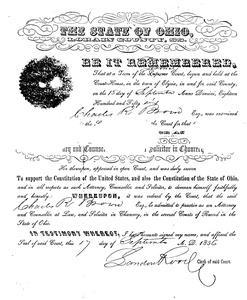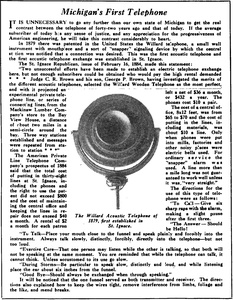The committee appointed by the President of the Marquette County, Michigan Bar Association presented the following memorial of the life of the late Honorable Charles Richards Brown:
 The Honorable Charles Richards Brown
The Honorable Charles Richards Brown
"Judge Charles R Brown was born 4 Dec 1836 in Lorain Co, OH. His early education was received at an academy following which he studied at Baldwin University (now Baldwin Wallace University) at Berea, OH. After this he taught school for two years. When he was nineteen years of age Judge Burke, a railroad attorney of Elyria and later of Cleveland, OH, took him into his office where he began his training for his life career. He was admitted to the bar in OH in 1855.
 September 17, 1856, Ability to practice law in the state of Ohio
September 17, 1856, Ability to practice law in the state of Ohio 1858 Newspaper, Shelby Pioneer - page 1 of 4 (Shelby, Ohio), published by C.R. Brown
1858 Newspaper, Shelby Pioneer - page 1 of 4 (Shelby, Ohio), published by C.R. Brown
In 1860 he moved to St Joseph, Berrien Co, MI, where he served as circuit court commissioner and prosecuting attorney.
In 1867 he was chosen to represent Berrien Co in the State Legislature. While in the Legislature Judge Brown became acquainted with Mr Marsh Giddings, of Kalamazoo, afterwards Governor of New Mexico, with whom he formed a partnership for the practice of law in Kalamazoo. Judge Brown removed to Kalamazoo to be associated with Mr Giddings in the latter part of the year 1867. From 1870 to 1876 Judge Brown served continuously as presiding judge of the Ninth Judicial Circuit, comprising the counties of Kalamazoo, Allegan and Van Buren. During this period of service on the bench, Justice John W Stone, Judge H F Severens, former US Senator Julius C Burrows of MI and former US Senator Arthur Brown, of UT, were among the leading members of the bar of the circuit.
["Probably the most interesting cause ever tried at Kalamazoo was the celebrated Vanderpool murder case, before Judge Brown which commenced on the 19th of October and ended on the 21st of November 1870. It was the most noted trial in the history of Western Michigan, and produced an immense amount of excitement during the twenty-seven days of its continuance.
George Vanderpool was arrested and tried at Manistee, (MI) in the spring of 1870, for the murder of Herbert Field. The jury found him guilty, and he was sentenced to the penitentiary for the term of his natural life. The murder of Field occurred on the 5th of September, 1869.
The case was taken up on the 19th day of October and continued for a period of twenty-seven days, creating intense interest as it progressed to the final close on the 21st of November. The jury was unable to agree, standing seven to five for conviction and the case was tried a third time at Hastings, in Barry County, (MI) and the jury rendered a verdict of acquittal." (History of Kalamazoo Co, MI, 106-107)]
While Judge of the Ninth Judicial Circuit, Judge Brown published two volumes of circuit court reports known as "Brown's Nisi Prius Reports" as well as school text books upon the Government of the states of MI, OH and IN, which were widely used at that time.
From 1876 to 1881 Judge Brown resided in Port Huron, MI, where he practiced law with the late B D Farrand, and where he promoted the construction and was secretary and attorney of the Port Huron and Northwestern Railway, from Port Huron to Harbor Beach, now a part of the Pere Marquette system.
In 1881, Judge Brown came to the Upper Peninsula (of MI), residing and practicing law at St Ignace until the spring of 1889, when he removed to Marquette. He rounded out his long and distinguished legal career with twenty-four years as a member of the bar of Marquette County, during which time he resided for two years in Munising (MI).
 1879 Article "Michigan's First Telephone"
1879 Article "Michigan's First Telephone"
As a practitioner, he took rank as one of the ablest men of the bar of the Upper Peninsula of MI, his practice extending into all the circuits of the Peninsula. It is the universal testimony of the bar that he possessed a splendid legal mind, and to and unusual degree the power of clear logical statement.
His success as a practitioner came from a combination of eloquence and sound logical judgement, for he was a clear and forceful speaker as well as a keen logical thinker.
Judge Brown was a man of impressive character, inspiring regard, trust and admiration. He was a genial, natural, approachable and kind. There will always remain in the memory of his fellow men the kindness of his hand. There was a charm to this genial and courtly gentleman such as belongs only to a good, noble and beautiful nature. Such a character was made to be admired. His life represents a long period of faithful and distinguished service in the performance of which he became widely known as a man of great ability.
The love of study became a ruling passion in his earliest youth and throughout his life he devoted himself to broad study. He took a deep interest in psychological and philosophical studies. He was also an active and zealous worker in the Methodist Episcopal Church."
(Memorial to Charles Richards Brown)







